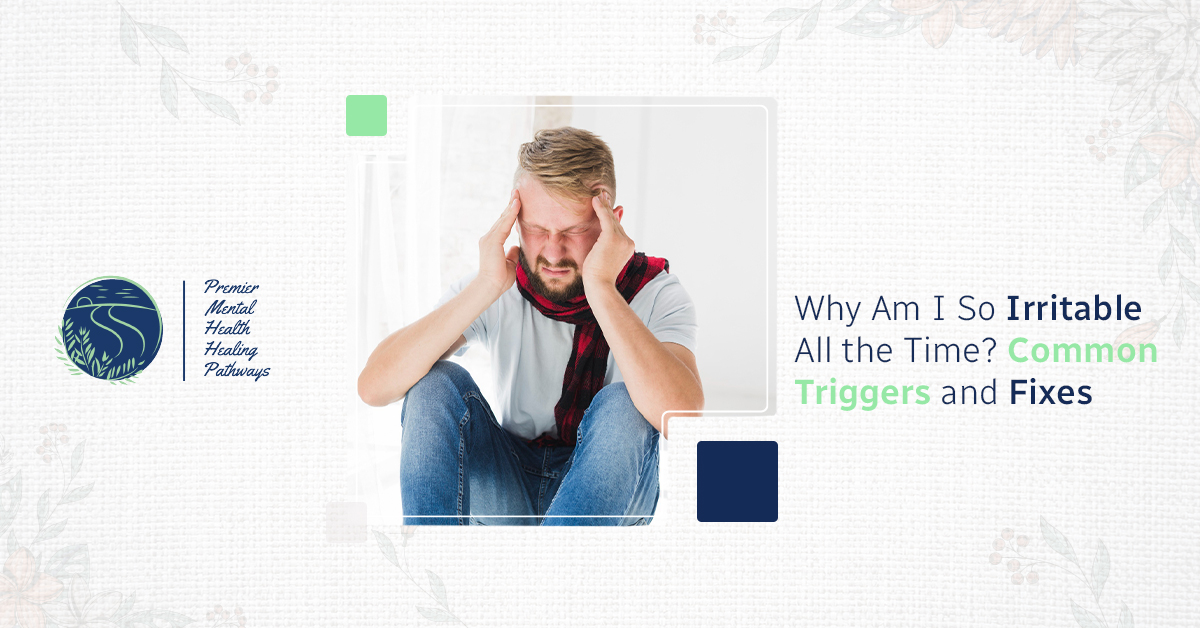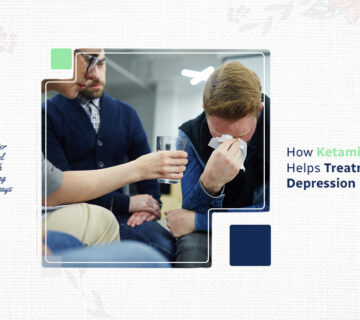Do you get irritated easily, even by small matters? It can be rather tiresome to have a bad mood constantly. You may be short-tempered, easily angered, or tense without cause. This may cause life to be more difficult and a strain on your relationships.
Yet being irritable does not make you a bad or angry person. It is another way your body and mind tell you something is happening.
Understanding what causes your irritability and how to manage it can help you feel better. At Premier Mental Health Healing Pathways, we help many people understand and cope with irritability.
Let’s look at some common triggers and fixes to feel calmer.
What Is Irritability?
Irritability consists of being impatient, angry, or offended effortlessly. Not only bad moods, but minor problems or petty issues may also upset you in no time.
Common signs of irritability include:
- Snapping at others
- Trouble relaxing
- Feeling tense or on edge
- Getting upset over minor things
When irritability occurs frequently, it may damage your work, health, and friendships.
Why Am I So Irritable All the Time?
Irritability has many sources. It often signals a deeper issue. These are some reasons:
-
Lack of Sleep
Sleep deprivation does not allow for clear thinking or controlling emotions. When you are worn out, minor irritations look very large.
-
Stress
Stressful situations can put your body in a state of high alert, making you more easily irritated.
-
Poor Nutrition
Missing meals, eating excess sugar, or failing to eat enough vitamins may harm your mood. More specifically, low blood sugar levels may leave you feeling irritable out of the blue.
-
Mental Health Conditions
Irritability is most often caused by anxiety and depression, ADHD, PTSD or even mood disorders. At times, irritability is a warning signal of these disorders.
-
Hormonal Changes
Mood swings and irritability may be caused by changes that occur during PMS, menopause, pregnancy, or thyroid problems.
-
Chronic Pain or Illness
Living with ongoing pain or health problems can naturally make you feel more impatient or frustrated.
-
Substance Use or Withdrawal
Mood can be influenced by alcohol, caffeine, or specific drugs. Irritability can also increase with addiction cessation.
How Irritability Can Affect Your Life
If irritability becomes a daily habit, it can cause:
- Arguments with friends, family, or coworkers
- Isolation because people may avoid being around you
- Guilt after you say something hurtful
- Work problems due to conflicts or poor focus
- Health issues from constant stress
At Premier Mental Health Healing Pathways, we see how this can create a cycle: you feel irritable, react strongly, then feel bad afterwards, which can make you even more on edge.
Fixes for Irritability
Irritability is controllable. Here are some procedures to help you feel good:
-
Sleeping Enough
Try to get 7-9 hours of sleep daily. You should form a bedtime habit; limit screen use late at night and make your bedroom a zone of restfulness.
-
Consuming a Healthy Balanced Diet
Eat whole foods, including fruits, vegetables, proteins, and fats. Do not forget about meals; have healthy snacks when you have low blood sugar.
-
Manage Stress
Make relaxation techniques that work for you. Among others, some ideas are:
- Deep breathing exercises
- Gentle exercise like walking or yoga
- Listening to calming music
- Talking with a therapist
-
Move Your Body
Exercise releases chemicals in your brain that help you feel good. Even 10 to 15 minutes a day can lower stress and improve mood.
-
Restrict Caffeine, Alcohol
Both can influence your mood and sleep. Attempt to reduce and see how it goes.
-
Identify Triggers
Write down a journal. Write the time you feel irritable and what you were in the process of doing, eating, or thinking. With time, trends will emerge.
-
Talk to a Mental Health Professional
If irritability is affecting your daily life, get help from a mental health expert. They’ll help you cope with your emotions.
When to Seek Help
Feeling irritable can harm relationships and daily life. Get help to manage your anger. You don’t have to live feeling on edge.
Premier Mental Health Healing Pathways provides care for anger management and irritability, as well as other mental health concerns. We work with you to:
- Build coping skills through therapy
- Manage medications if needed
- Understand your emotions with hypnotherapy
- Create stress-relief plans just for you
We’ll make a plan that fits your needs.
Why Professional Help Matters
Irritability may be a sign of more serious emotional problems such as depression, anxiety, ADHD, or PTSD. These are frequently more than lifestyle changes.
Medical attention will allow you to feel better quickly and prevent greater issues. At Premier Mental Health Healing Pathways, we offer:
- A safe, non-judgmental place
- Personalized treatment plans
- Support for kids, teens, and adults
- Therapy and medication, when necessary
Small Daily Habits That Help
Small changes add up. Try adding one or two of these to your day:
- Drink enough water
- Spend a few minutes outside for fresh air
- Take short breaks while working
- Perform gentle, deep breathing
- Record three things you’re thankful for
Final Thoughts: Common Triggers and Fixes
Irritability is not being bad or angry. It is your mind and your body demanding attention. Feeling calmer and more peaceful is possible when you are aware of your triggers and can use healthy habits.
We at Premier Mental Health Healing Pathways are here to support you on this journey. You deserve to feel understood and to enjoy life again. When you are ready to begin, contact us now.
FAQs
Q: Is irritability the same as anger?
No. Anger is a strong, sudden feeling, while irritability is the feeling of being annoyed or upset more easily. If not managed, irritability can lead to anger.
Q: Can diet affect irritability?
Yes. Poor food options, a lack of water, or diminished sugar levels can raise irritability.
Q: Do medicines assist with irritability?
Sometimes. In cases of irritability in mental health or a hormonal disorder, medication can be of assistance as a treatment option.






No comment